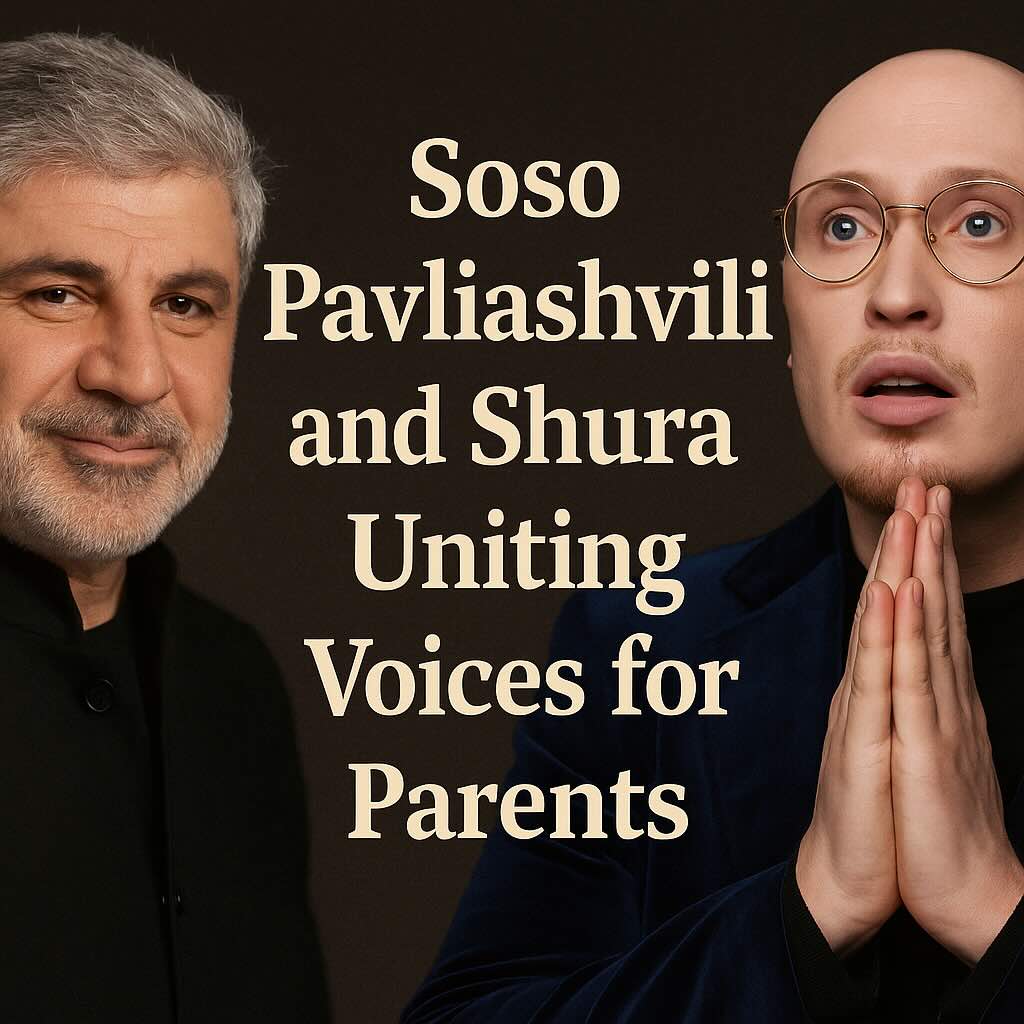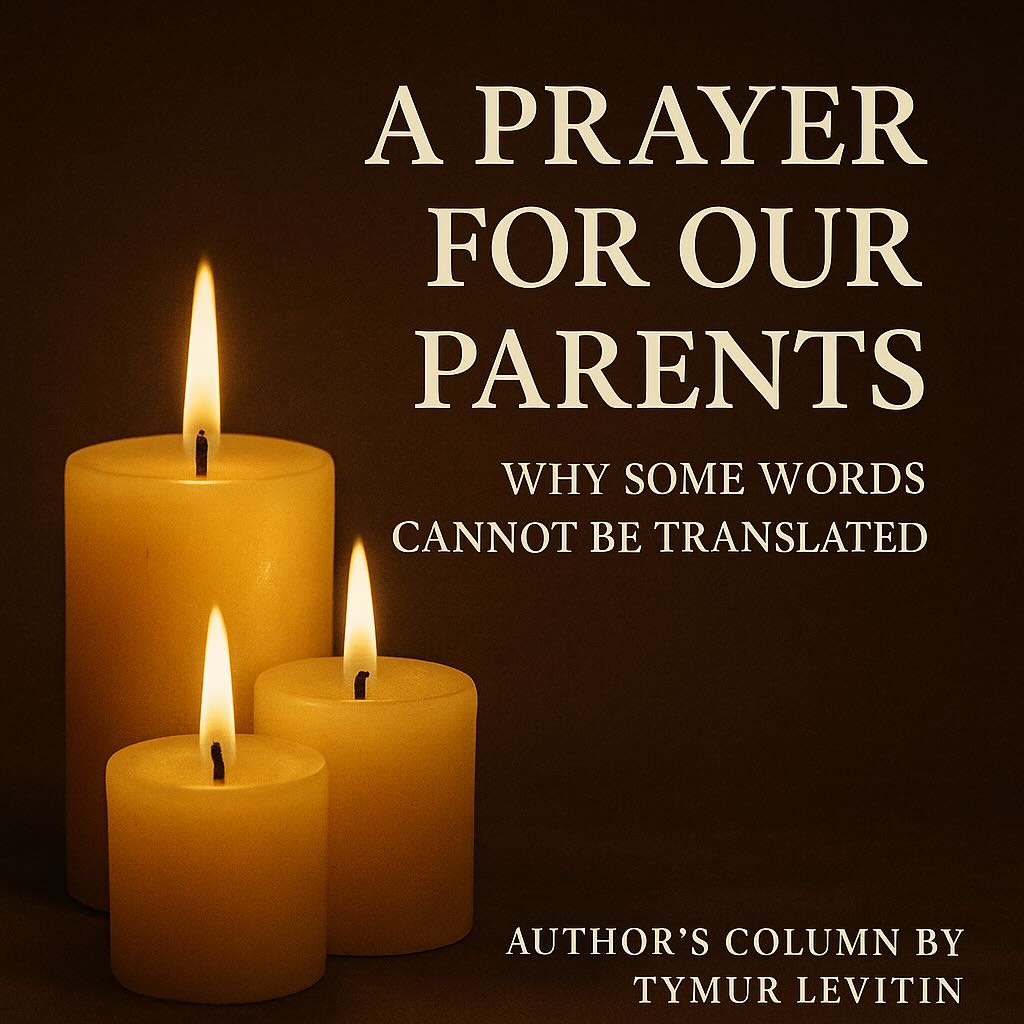Author’s Column by Tymur Levitin • Levitin Language School
🔗 Choose your language
🔗 Meet the Author
“Not everything that touches the soul fits into grammar.
And not everything worth saying can be translated.”
— Tymur Levitin
“Pomolimsya za roditeley” — Let us pray for our parents — is a Russian song that speaks, not to the ear, but to the memory.
It’s performed by two men — Shura (Aleksandr Medvedev), bold and broken, and Soso Pavliashvili, calm and deep — both of them grown sons singing not just a song, but a confession.
This is not a religious hymn.
It’s a human whisper:
“I love you, Mom.
Forgive me, Dad.
I didn’t mean to be far.”
🎙️ Two Men, One Wound
They come from different worlds:
- Shura, a queer-coded, scandalous artist of the Russian 90s, known for glitter, pain, and unapologetic vulnerability.
- Soso Pavliashvili, a Georgian musician raised in tradition, bringing masculinity with grace and weight.
And yet, together, they sound like one grown man standing at the door of his parents’ home, whispering through the years:
“I grew up too fast. But I never stopped being your child.”
💔 Let the Lyrics Speak
Я отпил у взрослой жизни рано…
I drank from adult life too early…
А вот сейчас бы убежать — в детство убежать…
Right now, I wish I could run — run back to childhood.
Как хочу к тебе прижаться, мама…
How I want to hold you close, Mom…
И папе тайны рассказать…
And tell Dad all the secrets I never told.
Вы простите мне разлуки грешность…
Forgive me the sin of distance…
И в час, когда станет холодать —
их души свечами согреем…
And when it starts getting cold —
we’ll warm their souls with candles.
🔍 The Word You Can’t Translate: Greshnost’
In Russian, грех means “sin”.
But грешность means something much softer and sadder:
a kind of quiet moral pain, shame not from action, but from absence.
It’s not just “guilt”.
It’s not just “sin”.
It’s a word that doesn’t exist in English.
Or German. Or Spanish. Or Hebrew.
In Slavic languages, being far from your parents is not just unfortunate — it’s wrong.
And that’s what makes this song impossible to translate literally.
🕯 “Warm Their Souls With Candles”
This image — warming a soul with a candle — sounds strange in English.
In Russian, it’s natural. Soft. Sacred.
In English, candles “light” things.
In Russian, they heal memories.
That’s why we must not just translate — we must rebuild the meaning.
🌍 7-Language Translations — and What Fails in Each
🇬🇧 English
Let us pray for our parents —
the living and the gone.
When the world grows cold,
let our hearts be the candles that warm their souls.
🗣️ Comment: Sounds clean and poetic, but “pray” may feel too religious. “Warm their souls” is emotionally right.
🇺🇦 Ukrainian (поетична адаптація)
Помолімося за батьків —
за живих і тих, хто вже в світлі.Коли холоне душа,
нехай наші серця стануть свічками.Пробачте нам мовчання,
пробачте відстань — ми все пам’ятаємо.
🗣️ Comment: Emotionally exact. “Помолімося” is grammatically correct, and the imagery of light, distance, and memory is beautifully preserved.
🇬🇪 Georgian
მოდით ვილოცოთ მშობლებისთვის —
ცოცხლებისთვის და მათთვის, ვინც ჩვენშია.
როცა სული ცივდება,
ჩვენივე სიყვარული იყოს მზე.
🗣️ Comment: Replaces candle with sun — culturally powerful and warmly emotional.
🇩🇪 German
Lasst uns für unsere Eltern beten —
für die Lebenden und diejenigen, die in uns weiterleben.
Wenn es kalt wird,
lassen wir unsere Liebe ihr Licht sein.
🗣️ Comment: German prefers “light” over “warmth”. “Wärme der Seele” sounds strange — tone must be adapted.
🇪🇸 Spanish
Recemos por nuestros padres —
los que están, y los que viven en nosotros.
Cuando todo se enfría,
que el amor sea abrigo de su alma.
🗣️ Comment: “Abrigo” — literally “coat” — is a powerful metaphor for warmth. Very effective and intimate.
🇫🇷 French
Prions pour nos parents —
vivants ou partis, mais jamais absents.
Quand la vie devient froide,
que notre cœur reste leur feu.
🗣️ Comment: French uses “feu” (fire) instead of candle. The phrasing is refined, but may lack raw emotionality.
🇮🇱 Hebrew
נתפלל על ההורים שלנו —
החיים והאחרים שבלב.
כשקר,
נשמור עליהם באור נר נשמה.
🗣️ Comment: “נר נשמה” (ner neshama) — literally “a candle for the soul” — is a real Jewish tradition. This is the most naturally aligned translation.
🧠 This Is Why We Learn Languages
Not to pass a test.
Not to ask for directions.
But to say:
“I’m sorry I didn’t call.”
“I miss my father’s voice.”
“I miss my mother’s hands.”
“I wish I told you how much I love you.”
That’s why at Levitin Language School, we don’t just teach grammar.
We teach:
Meaning over rules.
Feeling over correctness.
Honesty over perfection.
🎓 Try This
- Choose one line from the song.
- Don’t translate it.
- Try to say it in your language, the way your soul would say it.
Translation is not finding the right word.
It’s finding the moment where meaning begins.
✍️ Final Words
This song is not about death.
It’s about not being late.
If we don’t say it —
will our children say it for us?
So let’s learn languages not just to speak,
but to mean what we say,
and say it — while there’s still time.
Not only between two languages — but between silence and speech.

📌 Explore more languages with us:
🔗 Learn English
🔗 Learn German
🔗 Learn Spanish
🔗 Learn French
🔗 Learn Ukrainian
🔗 Learn Hebrew
🔗 Learn Gerorgian
🔗 Meet the Author
🔄 This article is available in multiple languages:
🌐 Русский • 🇩🇪 Deutsch • 🇫🇷 Français • 🇪🇸 Español • 🇺🇦 Українська • 🇮🇱 עברית • 🇬🇪 ქართული
✍️ Author: Tymur Levitin
© Levitin Language School | Start Language School by Tymur Levitin
Founder. Translator. Teacher. Son.
🕯 Dedicated to everyone who still calls their parents.
And those who wish they could.
To those who miss their father’s voice…
and their mother’s hands.l.
© Tymur Levitin














